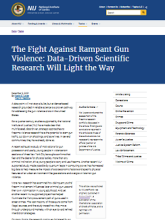Violent crime
How Prevalent is Violence in Missing and Unidentified Persons Cases?
Booker and Beyond Analyzing Sentencing Reform and Exploring New Research Directions
This webinar features a discussion of previously published research on the U.S. Supreme Court’s 2005 Booker decision - which effectively transformed the United States Sentencing Guidelines from a mandatory, to an advisory, system. The presentation will address selected research findings from the last 15 years. Individual participants will briefly review their previous research findings with particular attention paid to the analytic methods used.
See the YouTube Terms of Service and Google Privacy Policy
Public Mass Shootings: Database Amasses Details of Half Century of U.S. Mass Shootings
National Firearms Examiner Academy Forensic Science Training
A Descriptive Analysis of Missing and Murdered Native Women and Children in Nebraska, Barriers to Reporting and Investigation, and Recommendations for Improving Access to Justice
An Empirical Investigation of Organic Software Product Lines
Improving Bruise Detection with Alternate Light
Public cooperation and the police: Do calls-for-service increase after homicides?
Who Produces Online Hate?: An Examination of the Effects of Self-Control, Social Structure, & Social Learning
Prosecutors' Perspectives on Biological Evidence and Injury Evidence in Sexual Assault Cases
Multilevel Evaluation of Project Safe Neighborhoods
Project Safe Neighborhoods (PSN) is a DOJ-sponsored initiative to reduce violent crime, particularly gun crime, by fostering cooperation by criminal justice agencies and local partners to develop and implement strategic approaches.
See the YouTube Terms of Service and Google Privacy Policy
Amino Acid Specific Stable Isotope Ratios in Human Keratin Tissue for Region-of-Origin and Residency Determination
Transfer, Persistence and DNA Source Attribution of Trace Biological Material in Digital Penetration Assault Cases
Comparative Evaluation of Genotyping Technologies for Investigative Genetic Genealogy in Sexual Assault Casework
A Universal Method for the Detection of Organic and Inorganic Gunshot Residue based on Fast Fluorescence Mapping and Raman Spectroscopic Identification
Evaluation of the Occurrence and Associative Value of NonIdentifiable Fingermarks on Unfired Ammunition in Handguns for Evidence Supporting Proof of Criminal Possession, Use and Intent
NIJ-Funded Research on Firearms Violence in Urban Cities Advancing Scientific Evidence to Inform Practice
In this full thematic panel, renowned experts will present a series of papers summarizing the newest findings of NIJ-funded research projects on criminal offenses with firearms in urban areas. Researchers used various criminological and other theories, including routine activity theory, socio-ecological and socio-environmental perspectives, and advanced mixed-study methods, including surveys and spatio-temporal designs, to produce scientific evidence to inform practice.
See the YouTube Terms of Service and Google Privacy Policy





